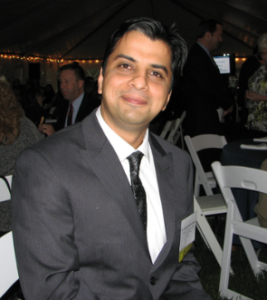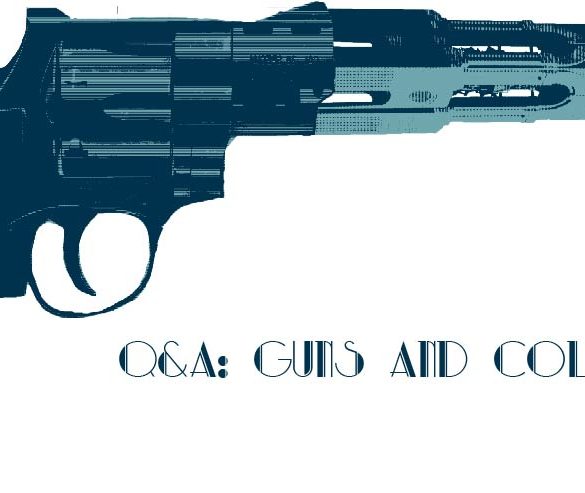Students who are pro- and anti-conceal carry on college campuses explain why their stance is valid.
Remain calm. Move quickly.
In a time where training for an active shooter situation is a necessity for most college orientations, it’s understandable that attitudes about concealed carry of a firearm on college campuses is a controversial issue.
“Shots Fired,” the Ball State active shooter training video, likens the odds of being involved in an active shooter situation to being struck by lightning. There are a few stark differences regarding this analogy. Dark clouds, sheets of rain, rumbling in the skies. Lightning has many blatant warning signs. It is not hidden. You know when it’s coming. Lighting isn’t concealed under the jacket of the student sitting 12 inches away from you.
Some students may feel safer knowing that they could have protection in the form of a concealed weapon if a situation did occur. Others believe that allowing weapons on campus, regardless of the reason, could contribute to a potentially more dangerous environment.
Even the law isn’t one hundred percent clear on this issue. The second amendment does state a right to bear arms, but the first amendment advocated for unprohibited free speech. This means that we’re allowed to express our opinions, no matter what they are. But what if someone you’re discussing a heated topic with has a differing opinion, they carry a gun, and they get upset at what you have to say? Does that right then hinder your ability to express yourself comfortably, like the First Amendment right should guarantee?
There are many complexities and details that need to be taken into account when discussing the issue of concealed firearms on campus. Currently, only eighteen out of fifty states ban concealed carry on campuses. This issue is being debated by lawmakers, journalists, and special interest groups. Ball Bearings sat down to discuss it with people who are directly affected by this issue: students and college employees, as well as the people who represent them. Following preliminary interviews, each person reflected on the thoughts of the others.
 Jim Lucas is an Indiana State Representative for District 69. He has authored legislation pushing for legal concealed carry on state property, including on college campuses. He belongs to the American Legion, The National Rifle Association, and Gun Owners of America. Jim is passionate about defending the right to bear arms and is a veteran of the United States Marine Corps.
Jim Lucas is an Indiana State Representative for District 69. He has authored legislation pushing for legal concealed carry on state property, including on college campuses. He belongs to the American Legion, The National Rifle Association, and Gun Owners of America. Jim is passionate about defending the right to bear arms and is a veteran of the United States Marine Corps.
I hate the term “allowing handguns on campus” because second amendment rights and even the state constitution, article 1 section 32, state that people shall have a right to bear arms for the defense of themselves and the state. So, we have a pre-existing right to carry firearms. Now, the state doesn’t allow us, so what the state has done is criminalized our right to carry a firearm.
Self defense is the first law of nature. People have the right to defend themselves. We are constantly hearing about sexual assault on campus, and a firearm is the best means of self defense, especially for women. With a firearm, a woman can defend herself against single, or even multiple attackers.
You know the old saying goes, “When seconds count, the police are only minutes away.” Say you’re walking down campus at night, how long is it going to take someone to get there and help you? You can’t answer that question because you don’t know. You can never know. What if your battery is dead on your cell phone, or what if you don’t have service? There are a million what ifs. But if you have a handgun, at least you have a chance to defend yourself.
The issue of concealed carry on campus is also a moral argument. Everyone has the ability to go out, get training, and learn how to safely carry a handgun. They have the ability to learn how to use it and learn how to defend themselves. Knowing that you have that ability, is it moral that you expect a police officer, who you don’t know, to risk their life to save yours, when it’s within your power to do so? They have families. They’re human. Why should I ask someone else, a complete stranger, to come save me?
Other people’s fear of guns doesn’t trump the natural right to protect oneself. College campuses are a gun-free zone yet over ninety percent of mass shootings are in gun-free zones. Ten other states allow campus carry—where are the shootouts with those states? Gun laws only work on people who obey gun laws. If you were wanting to kill a bunch of people, you’re going to go somewhere where they are defenseless.
Arguing that the first amendment protects someone from feeling uncomfortable and unable to freely express themselves around someone with a gun is a typical, liberal argument based on nothing but emotion. No facts, no reason, no logic, emotion only. To use the first amendment is laughable. They have a right to free speech, they have a right to worship, but no where in the constitution does it say that you have a right not to be offended. Or that your emotional rights trump someone else’s constitutionally protected national rights.

Angie Hubert is a Telecommunications major and is currently in her senior year at Ball State University. She is always around campus, filming or studying. She recently played Dr. Frank N. Furter in Ball State’s production of The Rocky Horror Picture Show. She is from Noblesville, Indiana. She has been to a gun range, and learned to shoot. Her parents own a World War II rifle from her grandfather.
For me, letting students and faculty carry a concealed weapon on campus comes down to education and whether or not the person carrying has the right credentials. While everyone does have the second amendment right to bear arms, that doesn’t mean that everyone should automatically be given a gun and be allowed to carry. Guns can do a lot of damage. You can take somebody’s life with one shot. I can understand why some people want to carry a gun on campus. But I think that with that, you need to be knowledgeable and have the proper licensing. You can’t just carry around a gun because you want to, you need to be respectful of the people around you and the establishments you enter.
For example, on Halloween night I played Dr. Frank N. Furter in Ball State University’s production of Rocky Horror Picture Show at Emens auditorium. Emens has a strict no-weapons policy, but the police officers stationed there for the show were visibly carrying guns. In light of all these crazy clown stories on the news, and with it being Halloween night, it did make me feel safer that armed professionals were there. When it comes to an average citizen or student carrying a gun, I think they need to respect the rules that are in place that do not allow guns in the auditorium. There were a lot of people in that auditorium and I feel worried that if the wrong person were carrying a gun, it might do more harm than good.
Looking at the demographic of people who are in college, it’s a bunch of dumb kids. Ball State has been considered a party school for the longest time and I think that most people think of students drinking, going out on weekends, and not being mature enough to carry a gun at school. I don’t think that everyone should be able to conceal carry, but if there was a certain association or a certain group on campus that regulated, trained, and vetted students who wanted to carry, then people would be more open to the idea. If the students or faculty went through this training then people would know they’re specifically there to help and are more educated on guns than the normal citizen, I think that would be more positive.
 Jagdish Khubchandani is an Associate Professor of Health Science at Ball State University. He has been published in a variety of scientific journals, and served on the Global Health Institute. His research has been discussed on national platforms such as Fox News, The Huffington Post, and the Chicago Tribune, among others. In 2013, he conducted a research study published in the American Journal of Health that found that students do not want guns in their schools.
Jagdish Khubchandani is an Associate Professor of Health Science at Ball State University. He has been published in a variety of scientific journals, and served on the Global Health Institute. His research has been discussed on national platforms such as Fox News, The Huffington Post, and the Chicago Tribune, among others. In 2013, he conducted a research study published in the American Journal of Health that found that students do not want guns in their schools.
I’ve found, after conducting studies at Midwestern universities, most students would rather stay away from guns. The majority of students surveyed in my study were not in favor of concealed carry on campus, and the majority also believed that we have too many unstable people on campus for concealed carry to be more beneficial than harmful. It’s a hard issue because you cannot control alcoholic behavior, drug use behavior, and fighting. All of these factors make carrying a gun on campus even more dangerous. I don’t believe there is an imminent threat here on campus that justifies students or faculty carrying firearms. We are not in a war zone. And, how many times has it happened that I, as a student, have a gun in my pocket and could save hundreds of people? If there were a mass shooting here, I would prefer to run.
There are 310 million guns in this country. How many of those guns have been used to save people? I know how many of them have been used to kill people. 33,736 people every year. And the sad reality is that most people think that guns are used to kill others, but most American people, especially white people, they use guns to kill themselves. It’s a nationwide problem. Out of 33,736, 19,392 gun deaths are suicides.
College-age students are especially at risk. According to the CDC, for ages 15-24, suicide is the second leading cause of death. The majority of the suicides, completed ones, use handguns. College students [could] struggle with their emotions, alcohol use, drugs, early pregnancy, too much pressure, stress, break ups… go to any Indiana campus counseling center and the number one cause of why they came to counseling center is depression or anxiety.
Students who are well educated can still make bad decisions. I’ve seen some very bright people with severe mental problems, to the extent that they want to kill themselves. 2.5% of students in this country think of suicide at least once in a year. If concealed carry were allowed on college campuses, guns would be more available to students already at risk for suicide. In this country suicide is a leading cause of death. This data shows their distress, and concealed carry would make it easier for them to die.
Reflections
Jagdish Khubchandani
Jim’s qualifications are good, but where is the research? As we have discussed, a leading cause of death for college students is suicide. He’s concerned about homicide, I am concerned more about suicide because the data shows that is a bigger problem here. If he can show some research, then I might reconsider his statements. He says policemen are people with families and asks why should they risk their lives to save me. If they shouldn’t save me then who should save me? I’ve lived in three countries. I have yet to find a politician I could truly respect for their logical thinking. Owners of guns, how many of them actually save themselves? And others? Guns put people in danger, whether it’s intentional or not, and can be especially unsafe if kids and young people are involved.
The CDC shows young people are dying from unintentional accidents [where they are] playing with guns and shooting themselves. College students who take a random sample survey on suicide and what their preferred means are, are answering handguns. In regards to Angie’s statements describing someone to regulate people who carry guns as a safety measure, that only regulates the person carrying or storing the gun, not all the people around them. So, you may have access, and you may follow the law and have a permit, and be allowed to carry on your campus, fine with you, but I may steal your gun any day and kill myself.
Number one: suicide. Number two: homicide. Number three: unintentional deaths. That’s what guns are being used for in the United States. If you could show me what percent of these guns are actually used for safety, and you were actually in an imminent threat, that would be a good study. I have not seen anything like that. The use of tobacco went down because we made it harder to get tobacco. By that logic, if guns were allowed, crime rates would go down, assaults, like Jim spoke of, against women would go down, but that is not the case. Jim and Angie mentioned the second amendment right to bear arms. In the end, anyone’s natural right to carry a gun does not invalidate my right, or students’ rights, to live.
Angie Hubert
I do think Jagdish made some good points. I agreed with the majority of what he said, however, he seemed to be very concerned with suicides happening as an effect of concealed carry on campus. It was an interesting perspective, and suicide risk isn’t something I would have thought of with this issue. I understand where he’s coming from, and he’s right that if the option to use a gun to harm yourself is there it does make it easier and faster to do so. But, the idea of concealed carry isn’t to kill, it’s to protect people.
This brings me back to my main point that if people want to carry a gun, that’s fine, they just need extensive training and education to do so. They need to be trained to use a firearm as an absolute last resort and not just because they can. I don’t think more suicides would happen, but because having a gun is a lot of power and people can get trigger happy, I could see unintentional accidents happening. I mostly agree with Dr. Khubchandani, but I think the cause and effect of allowing concealed carry is a little bit different from my perspective.
Jim makes a great point that gun regulation only works on people who obey laws. I suppose that adding more restriction to carrying a gun would just make some people sneakier about obtaining and carrying a firearm, which would just be more dangerous. I would rather someone go through training and obtain a gun than get one on the black market and not know how to use it to help people.
Jim pointed out that some arguments against concealed carry are based on emotion. I agree, but in contrast to Jim’s sentiments, I think it’s completely legitimate to argue against allowing firearms on campus from an emotional place. It’s okay to feel uncomfortable or afraid of peers carrying guns. Concealed carry on campus would allow people to wield an incredible amount of power and the means to take someone’s life—I mean, that’s an emotional situation.
He also spoke about endangering police when you could instead learn to protect yourself. Police are schooled and trained to protect and serve their communities. They know what they’re doing better than anyone else could. If I’m bleeding, should I not bother a doctor and try to sew myself up instead? If my internet goes out, should I try to learn how to rewire everything instead of calling a certified technician? It doesn’t make sense.
Police and military personnel go through unique training. If they want to use pepper spray, they have to experience being pepper sprayed. They carry a taser, but first they get tasered. That unique experience makes them understand the severity of their actions. It makes them understand the gravity of pulling a trigger. If students want to concealed carry firearms on campus, they too need to be trained and educated on what that power means—and just how much damage it can do if abused.
Jim Lucas
Jagdish’s comments were emotionally based and not objective. The first thing he should do is research states that allow concealed carry and get statistics. The second amendment protects the pre-existing right to carry—that should end every argument out there. If you don’t like it, change the constitution. Suicide was a main concern for Jagdish. When you compare the suicide rates in America to other countries, we are way behind. Other countries that have strict gun laws or even bans, have higher suicide rates. Guns aren’t the issue. A person who wants to kill themselves is going to find a way to kill themselves.
Jagdish found enough facts to back up his emotions, and then stopped. All he presented were “what-ifs.” He asked “what if a depressed roommate stole someone’s gun and used it.” That would be a felony. But, half of gun crimes are plead down. Pre-existing gun laws are not being enforced as severely as the law dictates. Instead of restricting a gun owner’s rights, the courts should be fully enforcing these laws. It’s not fair to take away a person’s best means of defending themselves just because someone else could steal it. Take the recent events at Ohio, for example. These “what-ifs” take away the rights of innocent people. Ohio is a gun-free zone, leaving innocent people defenseless. The perpetrator was stopped by a good guy with a gun. Shooters are either stopped by themselves or stopped by a good guy with a gun. Victims are made victims by unfair laws.
Angie also spoke from a place of emotion. She talked about feeling safer if guns were heavily regulated on campus. The only way to truly regulate people is to hold them accountable for their actions. There’s always going to be stupid people out there. But if those people see someone who was an idiot and is now serving three to five years in prison, the problem is going to regulate itself.
There is no perfect, safe environment. A prison is the most regulated environment in America. Bad things still happen there. The only way to change things is to hold people accountable for their crimes. Ohio was another incident of innocent, defenseless people being murdered. This further highlights the immoral and criminal state laws that take away the natural right to protect yourself and others, no matter where you are. I will fight with every cell in my body to restore that right to people.
According to National Crime Victimization Surveys, in 14,000 self-defense events, 127 (0.9 percent) involved self defense with a gun. That number may seem low and insignificant. It may support the idea that guns aren’t needed on campus, since they rarely are used in self defense situations. But to the 127 people who used the firearm, it possibly solidified their idea that guns can be a tool to protect yourself with. Both sides of the concealed carry on campus argument have solid reasoning. Would guns on campus protect people, or simply make it easier for accidents and tragedies to occur? Are college students willing to take a hefty risk to find out?
Regardless of whether or not concealed carry on campus should be allowed, it’s an issue that is dividing Americans and sparking frequent legislation. Research like Dr. Khubchandani’s indicates that the majority of students in the midwest do not want guns on campus, but there are also actions that indicate otherwise. For example, last year, Ball State students organized a demonstration with a national organization, called Students
For Concealed Carry, in order to advocate for concealed carry at BSU and protest the no-gun rule on campus. The students wore empty holsters to represent that their ability to protect themselves and others had been taken away. This shows that at least some support for guns does exist on college campuses.
Finding a solution to this issue will not be easy, or come quickly. In the wake of recent events at Ohio, and the myriad of events involving firearms that have happened in colleges around the nation, it is clear that the two sides of this issue will both continue to advocate for what they think is right, and a compromise might take a while to come to.




